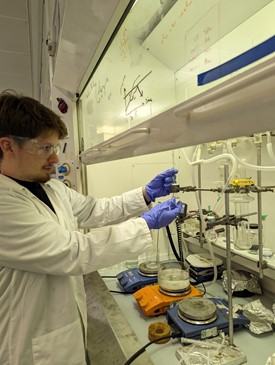My name is Alexander Röntgen (ESR12), and I am conducting my PhD at the Centre for Misfolding Diseases, University of Cambridge, UK. From 25-28 March 2024, I had the opportunity to visit our partner laboratory at Queen Mary University of London (QMUL) under the supervision of Prof. Marina Resmini. The laboratory is part of the School of Physical and Chemical Sciences located at the QMUL campus in London’s vibrant Mile End area.
The main objective of the Bio2Brain consortium is the development of formulations to deliver biopharmaceuticals via the intranasal route to the central nervous system. During this secondment, I had the chance to work with my colleagues Davide Mazzali (ESR9) and Gabriela Rath (ESR10). We performed a synthetic procedure to generate novel nanoparticles by high-dilution radical polymerisation. The innovative protocol developed in the Resmini group allows for a greener approach, using water instead of organic solvents to synthesise nanoparticles. Moreover, we employed various techniques to characterise the biophysical properties of nanoparticles, including dynamic light scattering (DLS) and surface tensiometry. The stay also allowed me to get to know the QMUL student community and to explore Mile End and its surrounding areas. I am grateful to Prof. Marina Resmini, Davide Mazzali, Gabriela Rath and all other members of the Resmini group that have made this stay a valuable experience, and I am looking forward to further collaboration.
